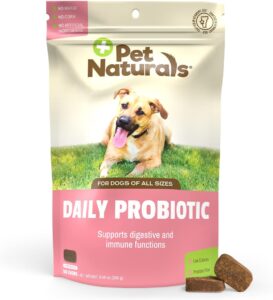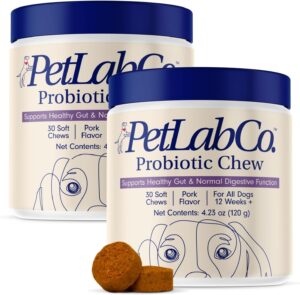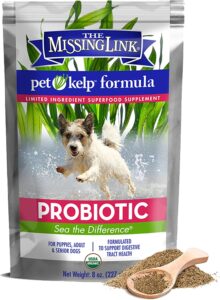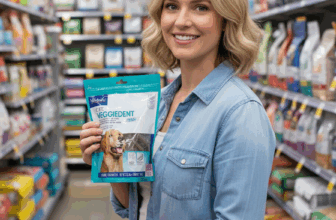
Table of Contents
The Basics of Probiotics
Probiotics are live bacteria and yeasts that are actually good for your dog’s health. They mainly help with digestion and gut balance. Think of them as the “good guys” in your dog’s stomach, fighting off the bad stuff.
How Dog Probiotics Differ from Human Probiotics
Sure, humans and dogs both benefit from probiotics, but dog probiotics are tailored to their unique gut flora. Giving your dog human probiotics might not hurt in a pinch, but it’s not ideal long-term.
Natural vs. Supplement Probiotics
Some dogs get probiotics naturally through their diet—others need a little boost. Supplements come in handy, especially for pups with digestive issues.
How Probiotics Work in a Dog’s Body
Gut Health and the Microbiome
A healthy gut means a healthy dog. Probiotics help keep your dog’s gut microbiome balanced, which controls digestion, energy levels, and immune health.
Immune System Boosters
Did you know that a big part of your dog’s immune system lives in their gut? Probiotics help fight off infections and keep your dog from getting sick as often.
Digestive Aid and Nutrient Absorption
Probiotics break down food better, helping your dog absorb more nutrients from meals. More bang for your buck on every scoop of kibble.

Pet Naturals Daily Probiotic for Dogs
Benefits of Probiotics for Dogs
Better Digestion and Less Gas
Nobody wants a gassy dog. Probiotics cut down on bloating, gas, and uncomfortable digestion.
Help with Diarrhea and Constipation
Probiotics can help firm things up—or get things moving. They’re often used to treat both diarrhea and constipation.
Skin and Coat Improvements
A shiny coat and healthy skin can actually start in the gut. Balanced bacteria can lead to less shedding and fewer skin issues.
Reduced Allergies and Itching
Some dogs scratch like crazy. Probiotics can help manage allergies and reduce inflammation that causes itchiness.
Mood and Behavior Stability
Gut health affects brain health. Probiotics might help your dog feel calmer and less anxious. Happy gut, happy mutt.
Signs Your Dog Might Need Probiotics
Digestive Troubles
Frequent diarrhea, vomiting, or irregular poop? That’s a sign your dog’s gut might be out of whack.
Frequent Infections or Allergies
Recurring ear infections or itchy skin could point to immune issues that probiotics can help with.
After Antibiotics Treatment
Antibiotics wipe out all bacteria—good and bad. Probiotics help restore balance after a round of meds.
Types of Dog Probiotics
Probiotic Powders
You can sprinkle this on food. Easy and often affordable.
Probiotic Chews and Treats
Tastes like a treat, works like a charm. Perfect for picky eaters.
Probiotic Capsules and Pills
More precise dosing, but can be tough if your dog hates pills.
Which Type is Best for Your Dog?
Depends on your dog’s size, health, and eating habits. Start with what they’ll actually eat.

PetLab Co. Probiotics for Dogs, Support Gut Health
Key Strains in Dog Probiotics
Lactobacillus Acidophilus
Great for overall gut health and fighting bad bacteria.
Bifidobacterium Animalis
Helps regulate digestion and improve stool quality.
Enterococcus Faecium
Boosts immune health and helps prevent diarrhea.
How to Choose the Right Probiotic for Your Dog
Look for CFU Count
CFU stands for “colony-forming units.” More isn’t always better, but you want a solid number—usually in the billions.
Consider Your Dog’s Needs and Health Issues
Got a senior dog? A puppy? Pick probiotics designed for their life stage or issues.
Check for Vet Recommendations
Some probiotics are vet-formulated. That’s usually a good sign of quality.
Risks and Side Effects of Dog Probiotics
Possible Side Effects to Watch Out For
Some dogs might get bloated or have gas at first. It usually passes (literally and figuratively).
When to Stop Giving Probiotics
If your dog gets worse or shows allergic reactions, stop and call your vet.
Natural Sources of Probiotics for Dogs
Yogurt and Kefir
Plain, unsweetened yogurt or kefir can give your dog a probiotic boost. Avoid anything with artificial sweeteners like xylitol.
Fermented Vegetables
Sauerkraut or kimchi? Maybe. But watch the salt and spices. Go plain and in small doses.
Are Human Foods Safe?
Some are, some aren’t. Always check before giving your dog anything new.

The Missing Link Pet Kelp Canine Probiotic
How to Introduce Probiotics into Your Dog’s Diet
Start Slow and Monitor
Introduce gradually and watch for changes in poop, energy, and appetite.
Adjusting Dosage
Follow the label, but you may need to tweak the dose based on your dog’s response.
Consistency is Key
Give them probiotics daily for the best results. Set a routine.
Common Myths About Dog Probiotics
All Probiotics Are the Same
Nope. Different strains do different things.
More is Always Better
Too many probiotics can actually cause issues. Balance is better than overload.
Probiotics Replace a Healthy Diet
They help, but they’re not magic. Good food still matters.
Probiotics vs. Prebiotics: What’s the Difference?
Role of Prebiotics
Prebiotics feed the good bacteria. Think of them as fertilizer for the probiotics.
Do Dogs Need Both?
Yes. Many good supplements have both for maximum gut power.
Vet Insights: What the Experts Say
When Vets Recommend Probiotics
Usually for digestive issues, after antibiotics, or chronic health problems.
Questions to Ask Your Vet
What strains are best? How long should I give them? Any side effects to watch for?
Top Dog Probiotic Brands to Consider
Reviews of Popular Products
Brands like Purina FortiFlora, Zesty Paws, and Nutramax Proviable get high marks.
What Makes a Brand Trustworthy?
Clear labeling, vet endorsements, and good reviews.
Conclusion: Should You Give Your Dog Probiotics?
If your dog struggles with digestion, allergies, or immune issues—or just needs a little health boost—probiotics might be worth a shot. They’re generally safe, easy to add to meals, and can make a real difference in your dog’s life.
FAQs
Can puppies take probiotics?
Yes, but use formulas made for young dogs and consult your vet first.
How long does it take for probiotics to work in dogs?
You might see changes in a few days, but give it 2–4 weeks for full effects.
Are probiotics good for dogs with allergies?
Yes, they can help reduce inflammation and support the immune system.
Can I give my dog human probiotics in a pinch?
It’s not ideal, but a small dose won’t hurt. Long-term, stick with dog-specific probiotics.
Do probiotics help with bad breath in dogs?
They can, especially if the bad breath is from digestive issues.






